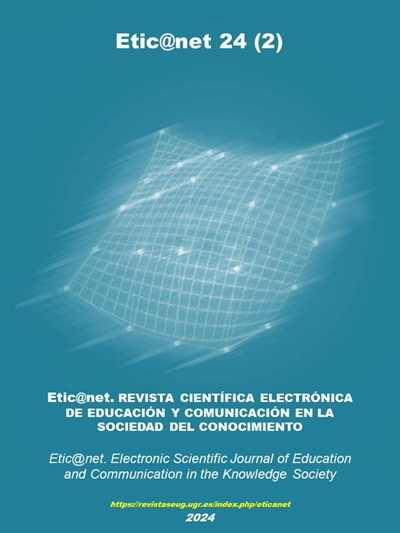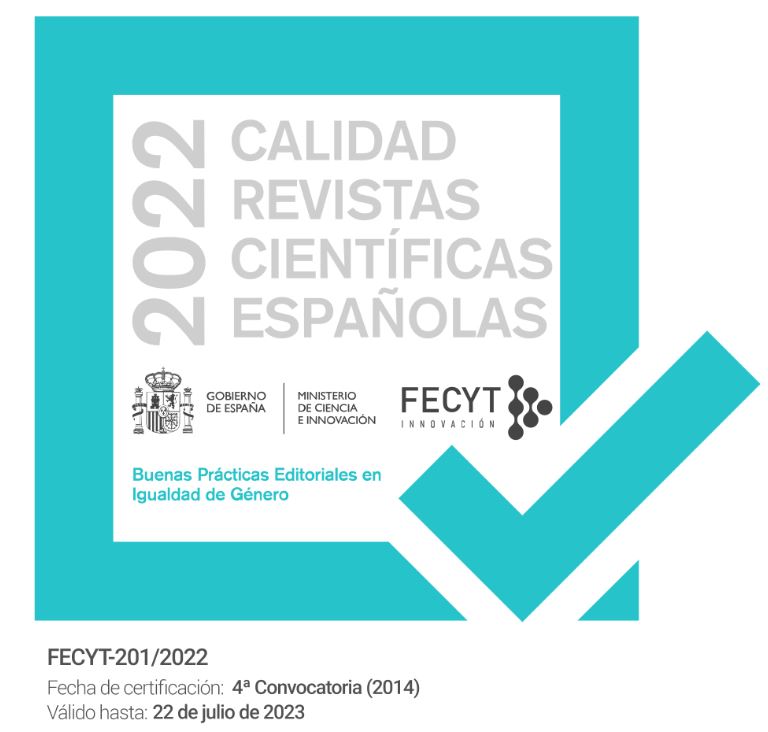Use of the Edpuzzle platform to promote autonomy and self-regulation of students in an online university
DOI:
https://doi.org/10.30827/eticanet.v24i2.31355Keywords:
autonomy, self-regulation, online education, educational videoAbstract
In an online university, developing students' autonomy and self-regulation is essential to promote their learning. In this educational environment, asynchronous proposals, such as the use of videos, acquire special relevance, since some of the main reasons for choosing this model refer to its flexibility and ubiquity. In this sense, the so-called enriched videos are another resource for personalizing learning, an audiovisual accessibility tool that will allow students to establish their own work pace. In this research, the use of the video platform Edpuzzle is analyzed with students of the Degree in Teacher in Early Childhood Education and the Master's Degree in Teacher Training for Compulsory Secondary Education and Baccalaureate, Vocational Training and Language Teaching at an online university. Through the use of focus groups, we have verified that enriched videos are very suitable for facilitating accessibility and developing student autonomy.
Downloads
References
Alastor, E., Guillén‐Gámez, F.D. y Ruíz Palmero, J. (2024). Competências digitais dos futuros professores do ensino pré-escolar e do ensino básico: um estudo de comparações múltiplas. Revista Latinoamericana de Tecnología Educativa, 23(1), 9-24. https://doi.org/10.17398/1695-288x.23.1.9
Alba, C. (2018). El diseño universal para el aprendizaje. Educación para todos y prácticas de enseñanza inclusivas. Morata.
Alvarado García, M.A. (2014). Retroalimentación en educación en línea: una estrategia para la construcción del conocimiento. RIED. Revista Iberoamericana de Educación a Distancia, 17(2), 59-73. https://bit.ly/2VNDlh2
Braun, V. y Clarke, V. (2019). To saturate or not to saturate? Questioning data saturation as a useful concept for thematic analysis and sample-size rationales. Qualitative Research in Sport, Exercise and Health, 13(2), 1-16. https://doi.org/10.1080/2159676x.2019.1704846
Canabal, C. y Margalef, L. (2017). La retroalimentación: la clave para una evaluación orientada al aprendizaje. Profesorado. Revista de Currículum y Formación de Profesorado, 21(2), 149-170. https://www.redalyc.org/pdf/567/56752038009.pdf
Cesare, D.M.D., Kaczorowski, T. y Hashey, A. (2021). A Piece of the (Ed)Puzzle: Using the Edpuzzle Interactive Video Platform to Facilitate Explicit Instruction. Journal of Special Education Technology, 36(2), 77-83. https://doi.org/10.1177/0162643421994266
Colombia, R. y Maldonado, C. (2009). Sobre la retroalimentación o el feedback en la educación superior on line. Revista Virtual Universidad Católica del Norte, 26, febrero-mayo, 2009, 1-18. https://www.redalyc.org/pdf/1942/194215516009.pdf
De la Iglesia-Villasol, M.C. (2019). Huellas de los estudiantes en las plataformas virtuales. Aplicación para evaluar una metodología de aprendizaje activo. Revista Electrónica Interuniversitaria de Formación del Profesorado, 22(3), 173-191.
Dembo, M.H., Junge, L.G y Lynch, R. (2006). Becoming a self regulated learner: implications for web based education. Annual Conference of the American Educational Research Association.
Elizondo, C. (2020). Hacia la inclusión educativa en la Universidad: diseñouniversal para el aprendizaje y la educación de calidad. Octaedro.
Fernández-Rodicio, C.I. y Abellán-Roselló, L. (2024). Revisión sistemática de investigaciones sobre la satisfacción con los estudios universitarios. EDUCA. Revista Internacional para la Calidad Educativa, 4(2), 383-408. https://doi.org/10.55040/educa.v4i2.107
Garcés-Manzanera, A. (2021). El contexto educativo en las material de lengua extranjera (inglés) en los Grados de Educación Primaria de las universidades españolas. En S.A. Flores Borjabad y R. Pérez Cabaña (Eds.), Nuevos retos y perspectivas de la investigación en literatura, lingüística y traducción (pp. 1406-1430). Dykinson, S.L.
García Jiménez, E. (2015). La evaluación del aprendizaje: de la retroalimentación a la autorregulación. El papel de las tecnologías. Revista electrónica de investigación y evaluación educativa, 21(2). https://doi.org/http://hdl.handle.net/10550/49873
Garello, M.V. y Rinaudo, M.C. (2012). Autorregulación del aprendizaje, feedback y transferencia de conocimiento: Investigación de diseño con estudiantes universitarios. Revista Electrónica de Investigación Educativa, 15(2), 131-147. https://bit.ly/3xIIDIt
González-Cabanach, R., Valle, A., Rodríguez, S., Piñeiro, I., García, M. y Mosquera, I. (2008). An intervention programme for the improvement of self-perceptions and self-beliefs. En A. Valle, J. C Núñez, R. González-Cabanach, J. A. González-Pienda y Rodríguez, S. (Eds.), Handbook of Instructional Resources & Their Applications in the Classroom (pp. 251-266). Nova Science Publishers Inc. https://bit.ly/3tC7iSj
Greenspan, S.B., Gordon, K.L., Whitcomb, S.A. y Lauterbach, A.A. (2021). Use of Video Conferencing to Facilitate Focus Groups for Qualitative Data Collection. American Journal of Qualitative Research, 5(1), 85-93. https://doi.org/10.29333/ajqr/10813
Gundumogula, M. (2020). Importance of Focus Groups in Qualitative Research. International Journal of Humanities and Social Science (IJHSS), 8(11), 299-302. https://doi.org/10.24940/theijhss/2020/v8/i11/HS2011-082
Hidalgo, M. (2024). Analysis of the concept of Digital Teaching Competence: a systematic literature review. Revista Latinoamericana de Tecnología Educativa, 23(1), 25-41. https://doi.org/10.17398/1695-288x.23.1.25
Jancsó, K. (2017). ¿Cómo darle la vuelta a la clase de ELE? El aula invertida y el uso de Edpuzzle y Powtoon en la enseñanza del español. Revista electrónica del Departamento de Estudios Hispániso de la Universidad de Szeged, 1, 100-107. https://bit.ly/3sPqB7Y
Kumar, A. y Kumar, G. (2018). The role of ICT in higher education for the 21st century: ICT as a change agent for education. Multidisciplinary Higher Education, Research, Dynamics y Concepts, 1(1), 76-83. https://bit.ly/2VDpnOA
Lores, B., Sánchez, P. y García, M.R. (2019). La formación de la competencia digital en los docentes. Profesorado, Revista de Currículum y Formación del Profesorado, 23(4). https://doi.org/10.30827/profesorado.v23i4.11720
Lozano Martínez, F.G. y Tamez Vargas, L.A. (2014). Retroalimentación formativa para estudiantes de educación a distancia. RIED. Revista Iberoamericana de Educación a Distancia, 17(2). https://doi.org/10.5944/ried.17.2.12684
Mahoney, P., Macfarlane, S. y Ajjawi, R. (2019). A qualitative synthesis of video feedback in higher education. Teaching in Higher Education, 24(2), 157-179. https://doi.org/10.1080/13562517.2018.1471457
Mariño, S.I. y Alfonzo, P. (2024). Formación en accesibilidad web. Contribuciones al acceso digital de información. EticaNet. Revista Científica Electrónica de Educación y Comunicación en la Sociedad del Conocimiento, 24(1), 329-342. https://doi.org/10.30827/eticanet.v24i1.29915
Maxwell, J.A. (2012). Qualitative Research Design. An Interactive Approach. Sage Textbooks. Serie: Applied Social Research Methods, 41. Sage.
Mosquera-Gende, I. (2021). El desarrollo de la competencia digital de futuros docentes en una universidad en línea. Bordón. Revista de Pedagogía, 73(4), 121-143. https://doi.org/10.13042/Bordon.2021.89823
Mosquera-Gende, I. (2022a). Flexibilizar el proceso de enseñanza y aprendizaje en una universidad online. Edutec. Revista Electrónica de Tecnología Educativa, 79, 199-213. https://doi.org/10.21556/edutec.2022.79.2351
Mosquera-Gende, I. (2022b). Las herramientas digitales en el diseño universal para el aprendizaje. En J. Ramé López, O. Serrano Villalobos y P. Hidalgo Cobo (Coords.), La necesidad de la transformación social desde la innovación docente y educativa (pp. 830-848). Aula Magna McGraw Hill. https://bit.ly/3ZxnZZJ
Mosquera-Gende, I. (2023a). Digital tools and active learning in an online university: Improving the academic performance of future teachers. JOTSE. Journal of Technology and Science Education, 13(3), 632-645. https://doi.org/10.3926/jotse.2084
Mosquera-Gende, I. (2023b). Perspectiva docente sobre el aprendizaje de inglés con herramientas digitales: implicaciones emocionales y actitudinales. TEJUELO. Didáctica de la Lengua y la Literatura. Educación, 38, 13-42. https://doi.org/10.17398/1988-8430.38.13
Mosquera-Gende, I. (2024). Digital competence of future English language teachers: Influence of age and gender on their self-perception. Forum for Linguistic Studies, 6(3), 357-373. https://doi.org/10.30564/fls.v6i3.6613
Nicol, D. y Macfarlane-Dick, D. (2006). Formative assessment and self-regulated learning: A model and seven principles of good feedback practice. Studies in Higher Education, 31(2), 199-218. https://doi.org/10.1080/03075070600572090
Olmos-Migueláñez, S. (2008). Evaluación formativa y sumativa de estudiantes universitarios: Aplicación de las tecnologías a la evaluación educativa. Ediciones Universidad de Salamanca.
Peñalosa Castro, E. y Castañeda Figueiras, S. (2021). Generación de conocimiento en la educación en línea: un modelo para el fomento de aprendizaje activo y autorregulado. Revista Mexicana de Investigación Educativa, 13(36), 249–281. https://bit.ly/3hIhdgG
Pérez-Chaverri, J. y Salas-Soto, M. (2016). Características de la retroalimentación como parte de la estrategia evaluativa durante el proceso de enseñanza aprendizaje en entornos virtuales: una perspectiva teórica. Revista Electrónica Calidad en la Educación Superior, 7(1), 175–204. https://doi.org/10.22458/caes.v7i1.1381
Perochena González, P., Cárdenas Lizarazo, J. A., Mosquera Gende, I. y Guerrero Barona, E. (2021). Autoeficacia del profesorado de matemáticas colombiano en relación con su autopercepción laboral y con otras variables. Universitas Psychologica, 19, 1-15. https://doi.org/10.11144/Javeriana.upsy19.apmc
Prendes, M.P., Castañeda, L. y Gutiérrez-Porlán, I. (2010). Competencias para el uso de TIC de los futuros maestros. Comunicar, 35, 175-182. https://doi.org/10.3916/C35-2010-03-11
Prendes, M.P., Gutiérrez, I. y Martínez, F. (2018). Competencia digital: una necesidad del profesorado universitario en el siglo XXI. Revista de Educación a Distancia (RED), 18(56). http://dx.doi.org/10.6018/red/56/7
Ribeirinha, T. y Silva, B. (2024). Student engagement in the Flipped Classroom model implemented in online learning. Revista Latinoamericana de Tecnología Educativa, 23(1), 43-59. https://doi.org/10.17398/1695-288x.23.1.43
Romero García, C., Amante García, B. y Buzón García, O. (2023). Training of the future teacher in the flipped learning model in an online environment. The Journal of Educators Online, 20(1), . https://doi.org/10.9743/JEO.2023.20.1.11
Romero García C., Mosquera Gende, I. Sánchez Prieto, J. y Tizón Díaz, M. (2021). Autoevaluación formativa y mejora del aprendizaje con herramientas digitales. En O. Buzón García, C. Romero García, y A. Verdú Vázquez (Coords.), Innovaciones Metodológicas con TIC en Educación (pp. 2746-2763). Dykinson S.L. http://bit.ly/3wXXosg
Sein-Echaluce, M.L., Fidalgo Blanco, Á. y García Peñalvo, F.J. (2017). Trabajo en equipo y flip teaching para mejorar el aprendizaje activo del alumnado. La Innovación Docente como Misión del Profesorado: Congreso Internacional sobre Aprendizaje, Innovación y Competitividad. https://doi.org/10.26754/cinaic.2017.000001_129
Thelwall, M. y Nevill, T. (2021). Is research with qualitative data more prevalent and impactful now? Interviews, case studies, focus groups and ethnographies. Library & Information Science Research, 43(2). https://doi.org/10.1016/j.lisr.2021.101094
Thomas, R.A., West, R.E. y Borup, J. (2017). An analysis of instructor social presence in online text and asynchronous video feedback comments. The Internet and Higher Education, 33, 61-73. https://doi.org/10.1016/j.iheduc.2017.01.003
Tümen-Akyıldız, S. y Ahmed, K.H. (2021). An overview of qualitative research and focus group discussion. Journal of Academic Research in Education, 7(1), 1-15. https://doi.org/10.17985/ijare.866762
West, J. y Turner, W. (2016). Enhancing the assessment experience: improving student perceptions, engagement and understanding using online video feedback. Innovations in Education and Teaching International, 53(4), 400-410. https://doi.org/10.1080/14703297.2014.1003954
Downloads
Published
Issue
Section
License
The authors who publish in this journal agree to the following terms: The authors retain the copyright and grant the journal the right to be the first publication of the work as well as licensed under a Creative Commons Attribution License that allows others to share the work with an acknowledgment of the authorship of the work and the initial publication in this magazine. Authors are allowed and encouraged to disseminate their work electronically (for example, in institutional repositories or on their own website) before and during the submission process, as it may lead to productive exchanges as well as further citation. Earliest and greatest of published works (See The Effect of Open Access).













